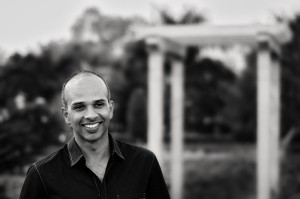 Who or what inspired you to become a writer?
Who or what inspired you to become a writer?
Probably everything good that I’ve ever read, combined with the fact that I discovered that there was a story I wanted to tell. The characters surfaced in my head, more or less fully formed, and at that point I knew they had to make it on to the page
‘The Smoke is Rising’ is your first novel, do you plan on writing more?
Yes! I’m currently working on my next novel. And for the first time, I’m attempting to write sex scenes, a truly traumatic experience. Fortunately, my collection of short stories is due out next year, so editing the short fiction provides a good sense of balance when I’m beginning to struggle with the novel
The Smoke is Rising is based in your hometown, Mysore. Are any of the city’s present realities part of the book?
There is a great deal that is based on the real contours of the city: geographical, social and political. But this is of course a work of fiction and there’s plenty to surprise people who are familiar with Mysore.
Do you relate to any of the characters in the book?
I relate to them in that I know them well — I have a full understanding of their particular histories, motivations and aspirations. Would I like to be stuck in a lift with them all? Absolutely not!
Since this book is based in your city, what kind of research did you put into writing it?
What’s significant is that I didn’t set out to write a novel set in Mysore. During the writing process I discovered that the city had got under my skin and was insisting on being at the heart of the novel. So I did not have to do much research: I simply wrote about what was around me.
The book tells the story of a number of different people, was a reason for this?
It’s the story of a city and so the novel required a broad canvas to portray a place like Mysore with authenticity. I hope the different strands in the book show both the energy and the stasis of its setting. There are corrupt city officials, a wealthy widow, inept local journalists, a recently married woman adjusting to life in the city, a self-made advertising magnate, a maid involved in a scandal, public sector bank employees who spend their mornings waiting for lunch, a star of Kannada cinema — these could be the realities of any of our cities.
You have been writing short stories for quite some time now, which do you prefer – short fiction or novels?
I think I feel a greater sense of satisfaction when I reach a point when I’m satisfied with how a short story has turned out, mainly because they are so difficult to write well. It’s a relatively short but intense period of writing from which you can reap a great reward; it’s not quite the same coming to, say, the end of a chapter of a novel. But what you don’t get from writing short stories is that incremental sense of progress as you advance through a novel.
Would you say there are challenges while making a transition from short story writing to novel writing?
I think trying to write good short stories really does make you a better writer. The discipline of moving from sentence to sentence, justifying each one, focusing on a compressed structure: it changes how you view the chapters in a novel. There is less of a risk of being ill-disciplined with shape and flow. The other way round, a novel to short stories, in my experience would be much harder.
Do you have a writer you seek inspiration from?
There are dozens and dozens. So I’ll just name a few whose work I’ve revisited in the last few months: Vladimir Nabokov, Muriel Spark, Junichiro Tanizaki, William Trevor, Lydia Davis, RK Narayan and Nadine Gordimer.
With Indian literature growing each day, do you have an author’s work you enjoy reading? Do you have recommendations for our readers?
Recently I’ve enjoyed reading Sachin Kundalkar’s poignant novel ‘Cobalt Blue’ (translated from the original Marathi by Jerry Pinto) and Shovon Chowdhury’s energetic satire, ‘The Competent Authority’.
What advice would you give to aspiring writers?
I’d say, as difficult as it is, just start and keep going. Don’t wait for the muse to strike, the weather to turn, the sirens to sing — they won’t. Make sure your chair’s comfortable, there’s some fresh air and pick your favourite font (you can change it back to New Times Roman when submitting). And, for most of us, probably better to go offline.
What do you say to people who claim those without a writing background cannot be writers?
I don’t think you need to have a specific background in terms of education or career. I do think you need to have an affinity with words, great curiosity, an ability to tell a story and a desire to rollick with the opportunities in language. And, crucially, I think you need to be a reader first, and then a writer.
Read the review of Mahesh Rao’s book The Smoke is Rising here : https://www.youthincmag.com/2014/06/01/the-smoke-is-rising-mahesh-rao/































